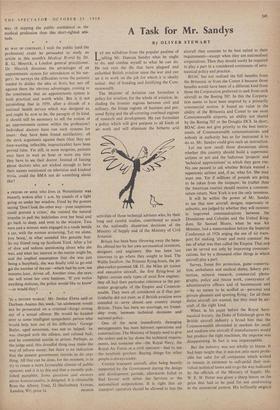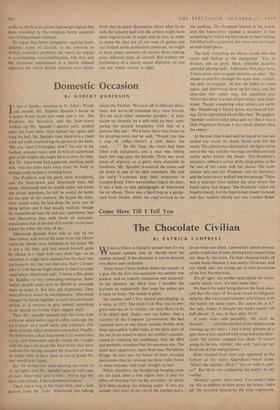A Task for Mr. Sandys
By OLIVER STEWART
He can cure the ills that have plagued and enfeebled British aviation since the war and can set it to work on the job for which it is ideally suited : that of bonding and fortifying the Com- monwealth. ET me withdraw from the popular pastime of telling Mr. Duncan Sandys what he ought to do, and confine myself to what he can do.
The Minister of Aviation can formulate a policy for aviation, for the whole of aviation, in- cluding the frontier regions between civil and military, the fringe regions of business and per- sonal flying and the all-covering overhead regions of research and development. He can formulate a policy which will give purpose to all kinds of air work and will eliminate the hitherto arid activities of those technical advisers who, by their long and careful studies, contributed so much to the nationally disastrous decisions of the Ministry of Supply and of the Ministry of Civil Aviation.
Britain has been busy throwing away the bene- fits offered her by her own aeronautical inventors, designers and engineers. She has been 'too timorous to go where they sought to lead. The Wallis Swallow, the Princess flying-boats, the jet- plus-rocket-powered SR 53, the Miles jet trainer and executive aircraft, the first flying-boat jet fighter, certain early types of axial flow engines: they all had their particular reference to the par- ticular geography of the Empire and Common- wealth. They were all considered as if that par- ticularity did not exist, as if British aviation were intended to serve almost any country except Britain., There has been no marriage, no friend- ship even, between technical decisions and national policy.
One of the most immediately damaging estrangements has been between operations and constructions. The Ministry of Supply used to give the orders and to lay down the technical require- ments, but someone else—the Royal Navy, the Royal. Air Force or .a civil operator—had to use the resultant product. Buying things for other people is always tricky.
Certain transport aircraft, after being heavily supported by the Government during the design and development periods, afterwards failed to find favour with either the Services or the nationalised corporations. It is right that air transport operators should be allowed to buy the aircraft they consider to be best suited to their requirements—except when they are nationalised corporations. Then they should surely be required to play a part in a considered continuum of aero- nautical policy and practice.
BOAC has not realised the full benefits from the Britannia or from the Comet 4 because those benefits would have been of a different kind from those the Corporation preferred to seek from such aircraft as the Boeing 707. In this the Corpora- tion seems to have been inspired by a primarily commercial motive. It found no value in the ability of the Britannia and Comet to use most Commonwealth airports, an ability not shared by the Boeing 707 or the Douglas DC8. In short, BOAC does not give priority to the best instru- ments of Commonwealth communications and nobody in authority has so far instructed it to do so. Mr. Sandys could give such an instruction.
Let me now recall those discussions about whether this country should build a supersonic airliner or not and the ludicrous 'projects' and `technical appreciations' to which they gave rise. No one paused to ask whether Britain wanted a supersonic airliner and, if so, what for. She may want one. Yet if millions of pounds are going to be taken from the taxpayer, he (rather than the American tourist) should receive a commen- surate return. New York is not the only terminus.
It will be within the power of Mr. Sandys to see that new aircraft designs, supersonic or subsonic, are judged by whether they will minister to improved communications between the Dominions and Colonies and the United King- dom. Sir Samuel Hoare, when he was Air Minister, laid a memorandum before the Imperial .Conference of 1926 urging the use of air trans- port for making 'closer and more constant' the ties of what was then called the Empire. That end can be served not only by improving communi- cations, but by a thousand other things in which aircraft play a part.
Survey, forest fire protection, game conserva- tion, ambulance and medical duties, fishery pro- tection, mineral research, commercial photo- graphy, police and rescue work, conveyance of administrative officers and of businessmen and —by no means to be scoffed at—personal and private pleasure and sporting flying : for all these duties aircraft are wanted, but they must be air- craft of the right kind.
When, in his paper before the Royal Aero- nautical Society, the Duke of Edinburgh gave the British aircraft industry a broad hint that the Commonwealth abounded in markets for small and medium-size aircraft if manufacturers would but produce the right machines, the response was disappointing. In fact is was imperceptible.
But the industry was not wholly to blame. It had been taught that it was not only more profit- able but safer for all companies 'which wished to remain in existence to soft-pedal their indi- vidual technical tastes and to go the way indicated by the officials of the Ministry of Supply. Mr. W. E. W. Petter was given a sharp lesson on the price that had to be paid for not conforming to the ministerial pattern. His brilliantly original work on the first jet-driven lightweight fighter has been rewarded by his company being squeezed out of independent existence.
To argue that fewer companies, making fewer different types of aircraft, is the solution to British aviation's problems (as many do argue) is a misleading oversimplification. The first and the dominant requirement is a clearly defined objective for which British aviation must strive. With that in mind discussions about what to do with the industry and with the airlines might have some logical point. It might well be that, in order to make the best use of our men of genius and our limited series production resources, we ought to have larger numbers of smaller firms making more different types of aircraft. But without the preliminary of a clearly stated objective, no one can say which course is right.







































 Previous page
Previous page